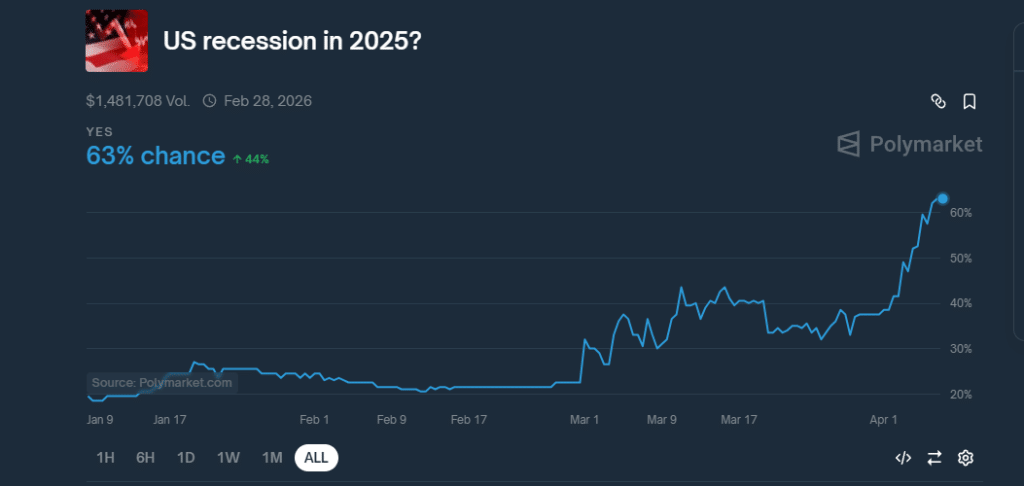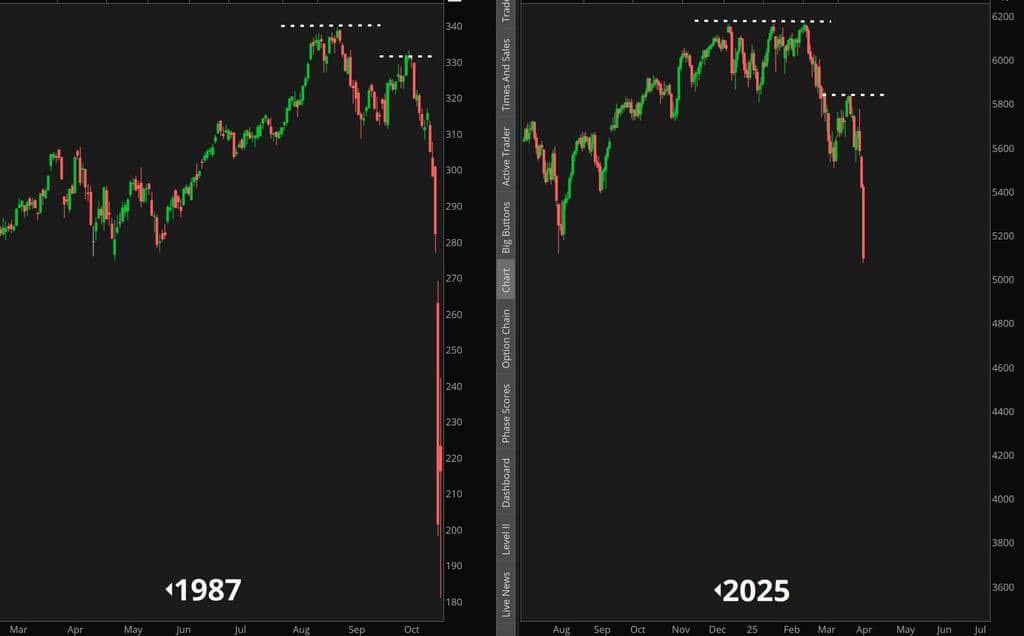Wall Street’s nerves are raw, and Jim Cramer threw gasoline on the fire. The CNBC host invoked the specter of 1987’s Black Monday, tying the turmoil to Trump’s “Liberation Day” tariffs. Cramer warned that the markets might buckle in ways we haven’t seen in decades unless something shifts.
Say what you will about Cramer’s track record, but even a broken clock is right twice a day.

Is There Any Correlation to Black Monday?
While Black Monday occurred in the 1980s, experts cite the Smoot-Hawley Act of 1930 as the first historical reference.
That Black Thursday opened as a gut punch, swith tocks crashing 11% before cratering further in the days ahead. Traders were left picking through the rubble, mourning a market that lost 25% of its value within 48 hours. What followed was the ugliest economic chapter in history, culminating in a global depression.
The Smoot-Hawley Act of 1930 turned the knife, raising tariffs when nations were already bleeding out.

Black Monday, occurring 50 years after the Depression, has a similar pattern to today.
The 1987 crash was a gut punch, erasing 22.6% of the Dow daily, the sharpest drop in U.S. history. Trump’s Liberation Day—a blanket 10% import tariff alongside targeted penalties of up to 54% on trading giants like China and India—is already shaking markets. By week’s end, the losses were on stark display:
- The S&P 500 dropped 6%, marking its steepest decline since March 2020.
- The Dow tumbled over 5%, reflecting growing investor fears.
- Global markets, from Asia’s Nikkei to Europe’s DAX, experienced significant dips, signaling widespread apprehension.
Experts like Cramer fear this could be a prelude to a larger market event if corrective measures aren’t taken swiftly.
We’ve Been in a Recession, The Biden Admin Changed the Definition
The point we’re making is that people like Jim Cramer are wrong. We HAD a recession, and we’re heading into one no matter who becomes president. You gotta love the gaslighting.
Under Biden, GDP dropped two quarters straight in ‘22 which normally is a textbook recession. WH & NBER dodged the labelling though. Oh and also this happened: pic.twitter.com/Z0SjbrAzbU
— David Nage
(@DavidNage) April 4, 2025
In 2022, the Biden administration redefined what constitutes a recession. For decades, two straight quarters of shrinking GDP were the gold standard of downturn diagnostics—clean, simple, brutal.
To avoid the bad publicity, they rewrote the definition to say that GDP alone isn’t enough to call a recession, throwing labor markets, consumer spending, and corporate investment into the mix.
Okay, Let’s Say a Black Monday Event Happens. What Are We Buying?
Canned beans, a gun, and ammunition? All jokes aside, this is a clear bottom opportunity to load up on more Bitcoin and leading L1 alternatives like Sui, Solana, and Polkadot.
Cramer’s talk of a “Black Monday 2.0” remains speculative, but the warning lights are there. What should give you pause is the same people who are wrong about everything are the most vocal against tariffs. Moreover, a lot of this is already priced in.
EXPLORE: XRP Price Jumps 11% After SEC Crypto Unit Tease XRP ETF Progress
Join The 99Bitcoins News Discord Here For The Latest Market Updates
Key Takeaways
- Wall Street’s nerves are raw, and Jim Cramer just threw gasoline on the fire calling for Black Monday 2.0.
- Say what you will about Cramer’s track record, but even a broken clock is right twice a day.
- Black Monday, occurring 50 years after the depression, has a similar pattern to today.
The post Black Monday Incoming: Jim Cramer Says Trump Tariffs Causing Recession appeared first on 99Bitcoins.











